#regimental stripe
Explore tagged Tumblr posts
Text
Summer, Tried & True…



#mature style#classic menswear#vintage style#classic style#seersucker#paul stuart#brooks brothers#regimental stripe#suede loafers#loafers#penny loafers#summer style#summer
2 notes
·
View notes
Text

On June 5, 1944, two members of the ‘Filthy Thirteen’ with the 101st Airborne Division, Clarence Ware applies war paint to Charles Plauda, before jumping into Normandy.
The Filthy Thirteen was the name given to the 1st Demolition Section of the Regimental Headquarters Company of the 506th Parachute Infantry Regiment, 101st Airborne Division. They were ordered to secure or destroy the bridges over the Douve River during the Normandy Invasion of Europe in June 1944. Half were either killed, wounded or captured, but they accomplished their mission.
This unit was best known for the famous photo which appeared in Stars and Stripes, showing two members wearing Indian-style “mohawks” and applying war paint to one another. The inspiration for this came from unit sergeant Jake McNiece, who was part Choctaw.
#filthy thirteen#101st airborne#us army#world war 2#wwii#dday#operation overlord#normandy#military#history
741 notes
·
View notes
Text
Second Lieutenant Harold Hemming on selecting NCOs from the recruits of the 12th West Yorkshire Regiment:
“There was no use picking out a few bright-looking chaps and telling them that they were corporals, for there was no way of indicating their rank. We did not even have brassards with stripes on them that they could wear over their coat sleeves. So I counted the men who had moustaches and found that I had just enough, so I made them all lance-corporals there and then …"
The British Army in WW1, a wonder of modern organisation.
996 notes
·
View notes
Text
Some concepts I did for clone formal-wear a few months back. I thought they deserved to have something nice to wear instead of just their armor all the time. I designed a warm and cold variant for the wearer’s comfort. Hats are to be taken off indoors and held at their side.


Original sketches vs. new ones I did today

An explanation on badges and buttons-The organization badge helps identify the soldier’s branch, def/off/other, and the corps. Organized by colored stripes and located on the right breast. Below the collar, legion stripes identify legion, regiment, and battalion. Also color coded. Over the left breast lays the rank plaque which specifies the specific rank of a soldier (ie. sergeant, lieutenant, commander��). Rank specific accessories are drawn in blue on the right side. Rank specific badges and medals are placed around the rank plaque. Earned medals and badges are placed closer to the organization badge and are not required to be displayed. It’s the decision of the wearer to display earned accessories.
Explanation of the individual design choices below

As a whole, their uniforms are largely based on Grand Republic Navy and Imperial Navy officer uniforms. The two are very close to each other given their in-universe relationship. I started with using the detailing shape of the clone officer’s uniform that trails from the shoulder to the bottom of the tunic. But I didn’t like that it curved at the midriff and I instead moved it to turn at the collar connection. I didn’t quite like the look of the asymmetry, so I evened it out by referencing the Imperial uniforms’ take on the detailing while still using the thicker cord from the Republic’s. The right side is the one that actually connects to the collar and opens the tunic while the left is decorative. The collar was inspired by Italian WW2 military uniforms used in some cold climates. They feature buttons on the collar corners that are engraved with the republic insignia. I kept the shoulder strips from the Republic uniform and added simple shoulder epaulettes. Of course I kept the tunic shape, but I’ve always disliked the jodhpurs so I’ve opted to replace them with slacks instead. However I LOVE the slick hats from the Navy uniforms and simplified them a tad to my liking. Finally, I kept the rank plaque and added a few other identifying accessories.

Now, this whole thing was inspired by the Italian WW2 uniforms I saw one day. I loved the large, poofy turtleneck that seemed so warm, and with my OCs being stationed on a cold planet, I wanted to give him something nice to wear at formal events. So, the turtleneck and thick, warm gloves were a must have. Instead of the turtleneck, the warm climate suit uses a classic Navy collar. The rest of the previously explained process came after this. And like I said earlier, I’ve always disliked the jodhpurs so I switched them out for slacks. I liked the way the loose pants on the Italian uniforms pooled into the boots. I mimicked that with the much higher Navy boots which are only in the cold outfit (+an extra layer of pants underneath). The warm outfit instead uses dress shoes to help optimize airflow. The loose slacks allow cool air to travel up and around the wearer’s legs and keep them from overheating. Only the first layers of clothing are required for the warm suit. The cold suit has several layers underneath which makes the fabric seem thicker compared to the warm climate suit. Personally, I really love the cold suit.
I think that’s everything I had on these designs, but if not I’ll add in a reblog or link it to a different post. Congratulations on making it this far, I hope you enjoyed my ramblings :) <3
77 notes
·
View notes
Text
Into real life (3)
Back in school things seemed to take on their normal routine.

I was back in class, had to work hard on the new subjects, that had been added to my curriculum by the Army Cadet program, I got some extra tutorials (and extra homework for that, had to basically do two years of Chinese, chemistry and physics in one year), but it was nice to be there, see my mates, hang out in the corridors.


But that was about the extent of my 'freedom'. Every other minute of my life was now controlled, scheduled, regulated.

I was no longer in school cadets, as I was ‘transferred’ to an Army Cadet squad, which had a fine reputation on performing display drills, and had also competed in regional and national finals.

By and large I spent every afternoon and early evening in the Army barracks. M&H training on Monday, Wednesday and Friday, drill on Tuesday and Thursday afternoons. On Saturday mornings I was going to have to drill my own platoon of 10-12 year olds, but that took a bit of time to get organised.
On Saturday afternoons I had to be available for Mess service, if there was an event in the officers’ club, or something, and I was also expected to serve there if there was a dinner.
Out of respect for my Dad my officer kept my Sundays free, to spend time at home, but I could be called up for ‘exceptional duties’, mostly to serve as a waiter during a lunch or stand as ‘honour guard’ during chapel services in a small group of cadets. We had to march in with regimental banners and stand to attention during the entire service.

Most Sundays I had quality time with Dad, but he was often busy, and I usually had a lot of homework or punishment work to get through. I had to do a lot of housework too, now that I had offered myself up to do all of Dad’s laundry too.
A real practical challenge was changing uniforms all the time. I mentioned before that I had to be in uniform always, except when asleep, in the shower or during school PE.
It took a lot of laundry, ironing and preparation to always have everything in perfect order.


I wore my school uniform five days a week, white shirt, blue and white striped tie, grey shorts, black shoes.

For M&H training I had to be in my ‘whites’, my school cadet uniform, white shirt, red and black striped tie, and all that; when we had lessons in dinner and lunch service I had to remember bringing my white gloves. Army Cadet drill was in green shirts, the uniform I wore during Elite Camp. All shirts had to be clean, fresh, perfectly ironed. I tried to cut corners once or twice, putting on a shirt that I'd worn the day before, and was that always found out.
At home I was to present myself for inspection every morning including weekends, but on weekdays I had to change to school uniform directly after that. If the inspection took a bit longer, or things were deemed insufficient, I could be ordered to change my entire uniform on the spot, and that meant I could run late for school.
When I got home after M&H I could stay in whites, after Drill I had to change into them, as it was designated as my default uniform for at home.

Sometimes this was only for a really short period, like when I got home at 8.50 and had to be in bed by 9.30 – I still had to get changed and make sure everything was perfect, because apart from the morning inspections I was prone to random visits by the inspectors, and they sometimes came at 9PM.
It was a lot to manage, but with the help of the inspections and regular punishments, I did OK. There was just no way I could escape it. It's quite amazing what a 15-year old can do if he sets his mind to it....

(All images are AI generated)
22 notes
·
View notes
Text
okay guys... i did so much research on how captain jack harkness dog tags will look like
so i will give yall a bit of lecture of the history and my drawing of the final product. this isn't totally accurate I JUST WANT TO PUT THAT OUT THERE. this is what i gather with the little information we got from jack history during ww2, plus i tried ;-;
im simply doing this not because i love jack but out respect to those who fought and service (and i dont only mean the american military)
alr nows thats said, lets get on it
now we all use to dog tags looking like this (second tag is missing)
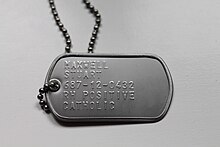
HOWEVER, during WW2 the dog tags were notched like this
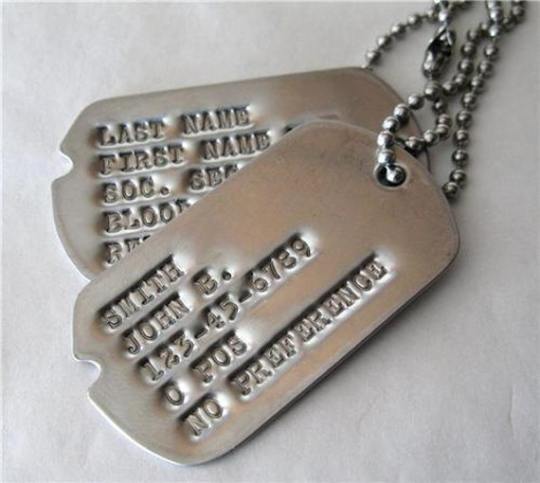
tho notched dog tags phase out by the 1970s
here the thing tho about jack, he's a American volunteer who fought for Britain during WW2. Meaning the dog tags are way different then what we Americans use
fun fact for those didn't know: while others use dog tags, the british military calls them identity discs (ID discs) or service discs. though i think ID discs are more commonly used
their ID discs looks like this
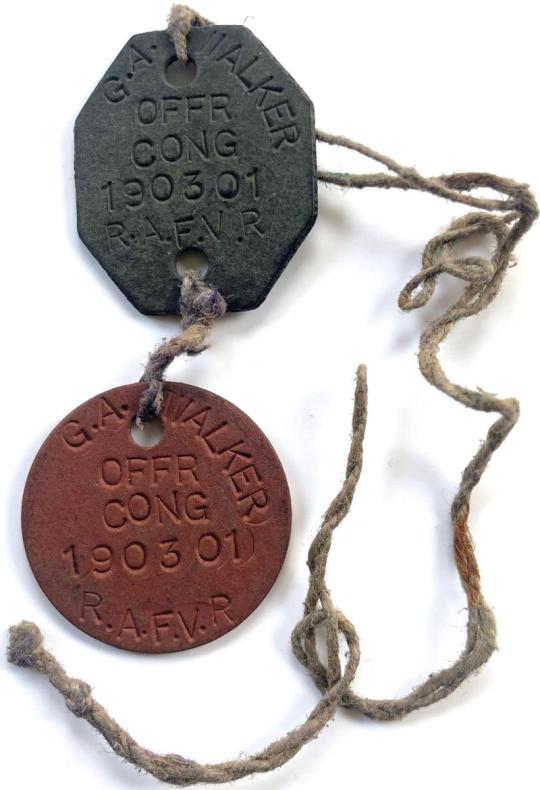
(obv this changed over time) Now having that, we got the identification on the discs to figure out
classic line from jack: "Captain Jack Harkness, 133 Squadron, Royal Air Force, American volunteer."
So he's part of the RAF and the Eagle Squadron (a three fighter squadron formed by volunteer pilots from the U.S. the squadron numbers were 71, 121 and 133)
also i want to mention that i believe the real Captain Harkness was award the Distinguished Flying Cross (DFC), which is award to those for an act or acts of valour, courage or devotion to duty while flying in active operations against the enemy. if he did hell yeah to him! hot, brave and smart? shit and folks wondering i have a thing for people in uniform😂
reference of him wearing a violet stripe service ribbon that i believe is the DFC medal and U.S Marine helicopter pilot, Major Chesarek, who was awarded the medal by the Queen in 2007. he's holding the medal and the ribbon among the others he earned. congrats on him btw!
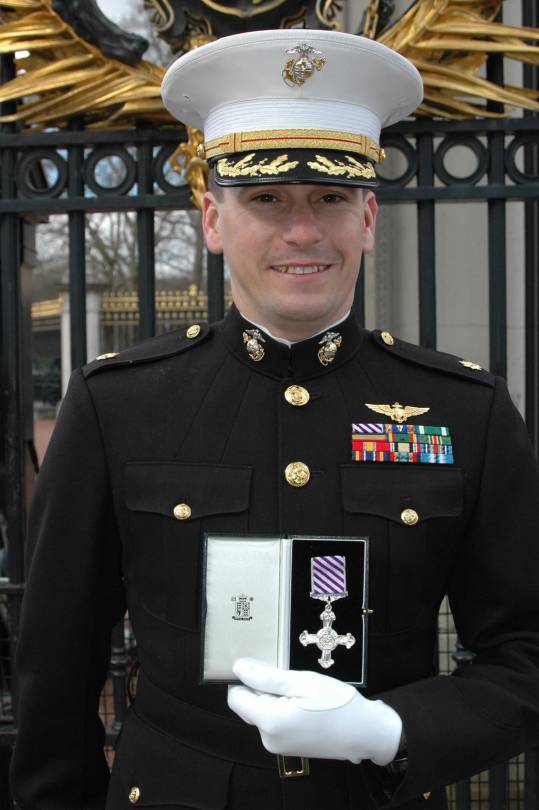

alr, back to why im actually here before hot folks get me distracted again
so the identification information:
name: J. Harkness; rank: offr (the reason not capt is cuz they're officers); regiment: R.A.F; religion: no preference (i think we all know why lol); service number (BARE WITH ME ON THIS ONE cuz this is pretty complicate for my small brain and these numbers actually mean shit and i don't got like jack shit on this information except the first digit): 137205
so it'll probably look like this with a proper chain:
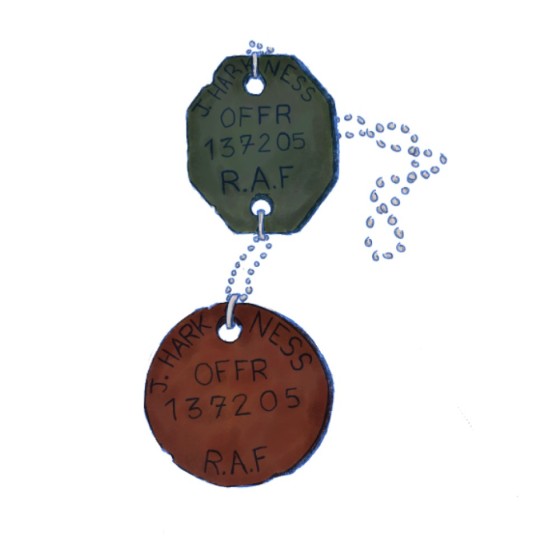
if yall have any comments something being wrong, it'll be much appreciated. if not, i hope you enjoyed
#doctor who#torchwood#i had fun with this one ngl#this is connected to other art piece im doing#captain jack harkness#jack harkness#military#ww2#dog tags
25 notes
·
View notes
Text
Mammals of Maglor’s Gap and Lothlann
Now that I’ve finished world building posts on birds for each Fëanorian realm pre Amon Ereb, I’m going through mammals next! Mammals of the March of Maedhros can be found here and my environmental world building Masterlist is here!
Maglor’s Gap was the widest break in the mountains and cliffs dividing Beleriand and the lands to the north. It lay between the blue mountains to the east and the March of Maedhros to the west. Lothlann was a wide expanse of plains to the north of the Gap. The rivers greater and little Gelion ran around the western and eastern borders.
Forest steppes: wild goat, wood bison, southern white breasted hedgehog, gray marmot, ground squirrel, dormouse, woolly hares, long eared hedgehog, gray shrews, northern hog badger, sable (rare), steppe mouse, lesser noctule (bat), wildcat, red fox, red deer
Bordering mountain fences: Caucasian Tur, mouflon, chamois, alpine pika, pond bat, marbled polecat, saiga antelope, steppe polecat, mountain weasel, ibex (rare), argali
Plains: goitered gazelle, steppe wolf, wild horse, northern water vole (by the rivers), snow vole, grey dwarf hamster, common hare, common rabbit, striped field mouse, ural field mouse, harvest mouse, mountain hare, field vole (also primarily by rivers), wild horse
World building notes:
The horse based cavalry of Maglor is one of the few details we have about this region. I headcanon that the horses in question are a mixture of the descendants of the Valinor born horses brought by the Fëanorian host as well as wild horses from Estolad, Himlad, Lothlann and the other plains regions of Eastern Beleriand.
Sheep and goats provide the majority of milk and cheese products in the Gap. Some of these species are imported from other regions like sheep from Thargelion.
Domesticated bovine are rare in Eastern Beleriand outside Thargelion and parts of Estolad. There are however wild and semi domesticated bison such as the wood bison, especially on the borders of forested and forest steppe regions. Fur, skin and bones from bison are used by both Noldorin and Avarin elves for clothing and other materials.
Wild hamsters, rabbits, hares and voles were used by a select few of Maglor’s cavalry as companions and even spies.
A regiment of foot based scouts had the sigil of a hare in the form of a light silhouette upon a black background.
55 notes
·
View notes
Text
Philippine Army Special Forces Regiment (Airborne) battle IS-linked militants in Marawi, 2017. Dig that tiger-stripe camo!
23 notes
·
View notes
Text








The other men of the company admired Winters for his jovial and modest attitude – Sobel believed Winters would use this affection to his advantage and usurp him from his commanding position, though this was not Winters’ aim. Winters did doubt Sobel’s ability to effectively lead the company in battle – a fear which other men in the company shared. Sobel attempted to have Winters court-martialed twice, but was unsuccessful on both occasions. So devoted were the men of the 506th to Winters that many complained of the unfair treatment of Winters by Sobel and delivered ultimatums that Sobel be replaced or they would surrender their stripes to the regimental commander of the unit, Colonel Robert Sink.
43 notes
·
View notes
Text
Buddietommy family beach day
Buck and Christopher scheming trying to decide whether they should try to team up with Tommy to bury Eddie in the sand or team up with Eddie to do it to Tommy
Eddie just wants to read his book (it’s one of those romance novels with a cartoon couple on the cover he’s finally comfortable taking out in public As A Man)
Tommy really wants one or both of his boyfriends to tell him he looks good in his new aviators
Clipboard Buck has a regimented sunscreen application schedule but he’s so focused on making sure the others adhere to it that it’s him with the peeling pink nose and cheeks at the end of the day
Tommy is in charge of the playlist. Christopher likes to tease him about his old man music
Buck insisted on the rainbow stripes beach umbrella. He was not able to convince Eddie and Tommy to wear rainbow trunks
They get burgers and fries from a beachfront restaurant and a seagull steals Only Eddie’s Fries
Tommy enjoys picking up shell fragments and sea glass so Buck can tell him about them. Buck enjoys hiding them all in Eddie’s pockets when he’s not paying attention
Eddie and Tommy split an ice cream. Buck thinks it’s terribly sweet but could never have been convinced to share a cone himself. Christopher got four scoops because Tommy was paying (as Christopher’s not-dad he has the hardest time saying no). Good thing Eddie and Buck have a hard time saying no to Tommy
Eddie can sit back and watch Buck (gamely) and Tommy (griping good humoredly about how he’s too old for this) chase Christopher in the waves and think about how much he loves them, and think about Shannon with peace instead of regret, and feel the most comfortable in his own head that he’s ever been
(Eddie’s the one who gets buried in the sand)
#buddietommy#eddie diaz#evan buckley#tommy kinard#christopher diaz#911 abc#911 season 8#911 headcanons#911 fic#tv: 911#buddie#bucktommy#eddietommy#eddie diaz get upppp hours#buck x eddie#buck x tommy#eddie x tommy#buck x eddie x tommy
49 notes
·
View notes
Text

Боевой путь легендарного полка "Нормандия-Неман" начался 5 апреля 1943 года. Правда, тогда полк еще был эскадрильей, которая называлась просто – "Нормандия". Свое имя подразделение получило неслучайно. Нормандия — наиболее пострадавшая от германской оккупации французская провинция, а название "Неман" добавилось позже, после успешной операции на реке Неман в 1944 году. Французы летали на советских истребителях "Як". Их украшали красные звезды, но между винтом и кабиной с обеих сторон каждой машины были нанесены по три цветные полосы – синяя, белая и красная (цвета французского триколора). В июне 1945 года французские летчики на 41 боевом самолете Як-3, переданном Советским Союзом в дар Франции, вылетели на родину. Во Франции пилоты "Нормандии-Неман" эксплуатировали эти истребители до 1947 года. Один из самолетов Як-3, на которых воевали асы легендарного авиаполка, сейчас хранится в Национальном музее авиации и космонавтики в Ле Бурже.
The combat path of the legendary Normandie-Niemen regiment began on April 5, 1943. True, at that time the regiment was still a squadron, which was simply called Normandie. The unit received its name for a reason. Normandy was the French province that suffered the most from the German occupation, and the name "Niemen" was added later, after a successful operation on the Neman River in 1944. The French flew Soviet Yak fighters. They were decorated with red stars, but between the propeller and the cockpit on both sides of each machine were three colored stripes - blue, white and red (the colors of the French tricolor). In June 1945, French pilots flew home on 41 Yak-3 combat aircraft, donated by the Soviet Union to France. In France, Normandie-Niemen pilots operated these fighters until 1947. One of the Yak-3 aircraft flown by the aces of the legendary air regiment is now kept in the National Museum of Aviation and Space in Le Bourget.
24 notes
·
View notes
Text

Argyle & Sutherland
2 notes
·
View notes
Photo

Erwin Rommel
Erwin Rommel (1891-1944) was a German field marshal who gained fame as a tank commander in the Fall of France in 1940 and then as the commander of the Afrika Korps in North Africa, where he gained numerous victories. Known as the 'Desert Fox' for his daring tactics, Rommel was obliged to commit suicide when suspected of involvement in the plot to kill the leader of Nazi Germany Adolf Hitler (1889-1945).
Early Life
Erwin Rommel was born into a middle-class family on 15 November 1891 in Heidenheim an der Brenz, southern Germany. His father was a mathematics teacher, a subject Erwin showed a talent for when he was not cycling and skiing. Keen to study engineering and perhaps join the Zeppelin airship company, Erwin ended up joining the army in July 1910, specifically, the 6th Württemberg/124th Infantry Regiment. In the German system, future officers joined the ranks to gain their first experience of military life. Rommel earned his sergeant stripes and an insight into the private's life, which would serve him well as a commander throughout his career. Completing his officer's training at the War Academy of Danzig (modern Gdańsk) in early 1912, Lieutenant Rommel served in the infantry regiment he had first joined in 1910.
By the time the First World War (1914-18) broke out, Rommel was a platoon leader. One biographer memorably describes the young officer as "the perfect fighting animal, cold, cunning, ruthless, untiring, quick of decision, incredibly brave" (quoted in Boatner III, 462). During the conflict, Rommel won both the 2nd and 1st class versions of the Iron Cross. He was next assigned to a special group of mountain troops where he served as a company commander. Here he learnt the value of mobility in modern warfare. For his role in capturing Monte Matajur near Caporreto in the Italian Alps in October 1917, Rommel gained another medal, this time the Pour le Mérite (Prussia's highest decoration), one of only two he would proudly wear for the rest of his life, the other being the Knight's Cross of the Iron Cross with Oak Leaves, Swords and Diamonds (the highest German decoration). By now a captain, Rommel saw out the war as a staff officer.
Continue reading...
42 notes
·
View notes
Text
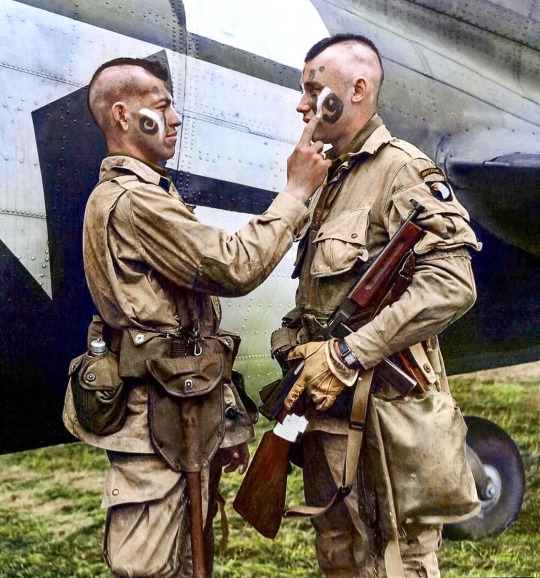
On June 5, 1944, two members of the ‘Filthy Thirteen’ with the 101st Airborne Division, Clarence Ware applies war paint to Charles Plauda, before jumping into Normandy.
The Filthy Thirteen was the name given to the 1st Demolition Section of the Regimental Headquarters Company of the 506th Parachute Infantry Regiment, 101st Airborne Division. They were ordered to secure or destroy the bridges over the Douve River during the Normandy Invasion of Europe in June 1944. Half were either killed, wounded or captured, but they accomplished their mission.
This unit was best known for the famous photo which appeared in Stars and Stripes, showing two members wearing Indian-style “mohawks” and applying war paint to one another. The inspiration for this came from unit sergeant Jake McNiece, who was part Choctaw.
#d day#operation overlord#us army#101st airborne#filthy thirteen#world war 2#wwii#normandy#paratroopers#military#history
391 notes
·
View notes
Text
Kisses <3
part one
ft. Chigiri, Raichi, and Kunigami, and a reminder that I'm a new blog looking for more requests <3
Hyoma Chigiri + shoulder/back kisses
Chigiri loves you and comes to you with everything eventually, but sometimes he can't help falling back into old habits. He'll pull away, distance himself, prepare to minimize himself and his needs... Anything to keep your own smile intact. He reminds you of a cat in a way, finding somewhere to burrow and hide instead of crying out.
The dissatisfaction and self-loathing coming off of him one day after practice shocks you. He's quick to dart past you, eyes downcast and without a word when you ask how it went today. All you hear is the slamming of the bathroom door before you're even done speaking. Well, looks like you'll have to go to the kitty yourself then.
He still doesn't say anything when you enter, but when you ask if he'd like company he nudges the glass door open right away. When you step in you can see the leftover dirt and whatnot swirling down the drain, and Hyoma just resting his forehead against the wall. You gently pull him back towards you into a hug, wrapping both your arms around him to push your face into your back. When he reaches up to squeeze your hands, you press a sweet kiss right in the middle between his shoulder blades.
"I'm here when you're ready, honey."
You press another, longer one into his skin and he shudders, melting into you. One of his hands reaches back to comb through your hair, pressing your face against him.
"Will you wash my hair? Please?" It's so quiet, so defeated, but that's okay- it's a start. You kiss his back a few more times under the warm water before reaching for his shampoo.
Jingo Raichi + overwhelming kisses
His mouth is on yours, hot and wanting and greedy, and you can still hear the others laughing and chatting in the locker room showers. When you whine and push back, he just growls at you and yanks you back by the hair. You're so pretty like this, he thinks, all flushed and needy for him against the lockers. He loves the way you look at him all needy and begging. You act so worried about his teammates, but you still have one leg wrapped around his hips to keep him close...
"Jingoooo," you whimper. "Someone is gonna he-"
He dives in, lips and teeth and tongue working across your delicate neck while he cups your ass to pull you closer to him.
"Don't care, just means they'll know you're mine." When he's finished marking his territory, he backs off again to look at you. One shaky hand clamped over your own mouth to keep your moans quiet, teary eyed from the stimulation, hips rocking against his to get whatever friction he would offer...
Fuck, you are delicious.
He leans forward, lapping a long stripe up your neck to catch the sweat there before licking open your mouth to pull some more noises out of you. He loves it when you give up and moan into his mouth, falling into him and just letting him take you. You're breathless and desperate and all you can see, taste, feel is him... It's the only thing he wants after winning a match like that.
Rensuke Kunigami + tummy kisses
If there's one thing you absolutely treasure with Kunigami, it's the days you get to wake up with him. Thanks to the constant touring and harsh exercise regiment, most mornings you woke up alone and sometimes he came back home. Mornings like this, however, where Kunigami gives in and stays in bed with you... They're a rarity you wouldn't give up for anything in the world.
You're shocked though when you manage to wake up a few minutes before him, getting to just gaze at him from atop his chest. His strong features look so soft in this light and it makes you coo softly, traces light patterns across his pecs. You think about how sweet he was last night, how sweet he always is with you, and you can't keep your hands to yourself. You gently pepper his neck and chest with quick little kisses before trailing down to his tummy. Relaxed as he is, you can still see the outline of his abs and it makes your mouth water.
You can see the little movements and twitches he's making, but you solider on. You gently kiss each muscle, running your lips whisper light across each divot and dip in his skin, loving how he clenches and unclenches in his sleep.
"Wha're doing?" It's so sleepy and cute when he finally wakes up, adoration for you shining in his gaze even this early. One hand finds your cheek, pulling you up to see your face. You resist, pressing a long open-mouthed kiss to the muscle you were on, before looking up to smile at him.
"Just a little hero worship honey, lie back and relax." He blushes and once again you find yourself cooing back to him. There was no way either of you were getting up now until you kissed every inch of him.
#blue lock#bllk#blue lock imagines#bllk imagines#blue lock headcanons#bllk headcanons#chigiri hyoma#kunigami rensuke#kunigami rensuke x reader#chigiri hyoma x reader#x reader#raichi jingo#raichi jino x reader#requests open#fluff
226 notes
·
View notes
Note
how do I dress like you?
starter capsule wardrobe for those looking to embrace rolandcore.
you're going to start with a dark neutral, either black or cool-toned mud brown, and then select a jewel tone accent color such as burgundy, violet, or forest green. for the sake of this guide, we're assuming your base is black and your accent is burgundy.
tops:
three (3) button-up shirts. I recommend a white/ivory, a midtone gray, and either a plain, a stripe, or a subtle pattern in your accent color, in this case burgundy.
three (3) turtlenecks or mock necks. white/ivory, black, and burgundy.
two (2) graphic tees, a black base and a white base. for maximum accurate choose a band tee (a shirt from scottish post-punk band franz ferdinand would be especially faithful to the vision) or something with some sort of occult vibe.
bottoms:
three to four (3-4) pairs of straight leg trousers. black, midtone gray, burgundy, and some sort of monochromatic pattern such as a black and gray check. you may want to add texture here in the form of corduroy or tweed.
knitwear:
two to three (2-3) sweater vests to layer over turtlenecks and button downs at least. at least one should have some sort of pattern that looks like you ripped it out of the early 90s, or perhaps with a motif such as rainclouds or crowns. a houndstooth or plaid pattern is also more than acceptable. one should be in burgundy, one should be black, and I recommend the third to either be a gray or a black/white pattern.
three to four (3-4) chunky knit oversized sweaters, again, to layer over turtlenecks and button downs. black, white/ivory, burgundy, and gray are recommended for this color palette. there should be some sort of visual interest here, either in the knit or the pattern or some sort of graphic.
outerwear:
two (2) blazers. one should be black. the other may be gray or burgundy. they may be plain or feature a subtle pinstripe or windowpane check.
one (1) statement coat. this is your showstopper. knee-length at the shortest. either in a burgundy wool or some dark charcoal herringbone. silver buttons a plus. people should notice you when you go out in it.
accessories:
three to four (3-4) ties. at least two should be in your accent color. they may be plain, feature regimental stripes, polka dots, coats of arms, or some other pattern. one may feature a more novelty design, such as a geometric or an interesting print.
silver tone jewelry such as rings, necklaces, bracelets, and brooches, to taste.
black socks. plain, striped, or perhaps a subtle print. throw in a couple of pairs of burgundy socks as well.
shoes:
one (1) pair black loafers. they may be penny loafers, horsebit loafers, oxfords, derby shoes, or monkstraps.
one (1) pair of formal-looking black ankle or calf-length boots.
for summer:
two to three (2-3) short sleeve button down or camp collar shirts to layer over your outfits so you can have a structured outfit without sweating yourself to death. black, gray, or burgundy as usual. preferably oversized.
three to four (3-4) pairs of shorts, cotton or linen, in sensible colors keeping to the palette.
a minimum of four (4) additional tees. you may now bring in the burgundy if you wish, or continue with black, white, and gray.
all of these items can be thrifted (with the exception of socks. please buy socks new.) with relative ease, depending of course on where you're living. once you have a solid hold in your (well. my) style and are comfortable mixing and matching the pieces you have, you may branch out by purchasing further pieces in these colors, adding pieces in a new neutral (such as mud brown or taupe), or adding an additional accent color to wear with your neutrals. back in the day I would make little capsule wardrobes like this in polyvore and play around with them. they were lolita fashion capsule wardrobes, but still. the point stands. if anyone is interested in seeing that, I might take some time to draw something up
hope this is to your expectations! ich hab die ehre
9 notes
·
View notes